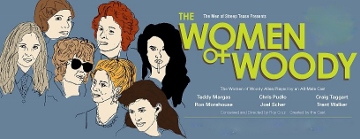WOODY LIGHT
One iconic comic writer; eight monologues cut from the screen time of seven of his most memorable female characters; a six-person, all male cast: Those are the ingredients of Roy Cruz’s latest monologue-homage-comedy show, The Women of Woody, presented by Oh My Ribs! last weekend.
Cruz’s last project in this vein was the long-running Streep Tease, in which several of these same actors (billed on this program as “The Men of Streep Tease”) took turns interpreting some of the best-known Meryl Streep characters.
This iteration of the conceit ’” the adored grandes dames of Woody Allen’s oeuvre brought to life on stage in well-intentioned fan-boy fashion ’” does not quite manage to skirt some of the issues Streep Tease seems to have encountered. This may be a pleasant way to spend an evening, but a lack of dramatic context detracts from its potential impact, comedic or otherwise.
The main issue of The Women of Woody seems to lie in its somewhat scattered direction and selection of material. Even a collection of monologues can, in the right order, tell a story, possess a strong dramatic arc, and make for a moving theatrical experience. Why, then, did Cruz choose to kick off the set with a brief aside to a pedicurist in Bullets Over Broadway and end it with an unexpected appearance of Woody Allen himself (Trent Walker) for an Annie Hall wrap-up?
Perhaps the monologues themselves were chosen by the performers, which seems possible; yet the sequence in which they appear could be improved, as could the cuts within each piece. Joel Scher’s sultry Tina Vitale from Broadway Danny Rose and Ron Morehouse’s brilliant and effervescent Holly from Hannah and Her Sisters succeed as screen-to-stage, female-to-male transformations of Allen’s characters; on the other hand, Craig Taggart’s Linda Ash/Helen Sinclair hybrid, performed in gravelly and unsettling falsetto, threatens more than it amuses. Some monologues seem to be culled from scenes throughout a script, others appear to take place in one distinct block of time, and still others are combinations of pieces from different films; the reasons for editing the material in this haphazard way are not made clear in the confusing performances that result.
Unfortunately, Cruz as director/conceiver does not make sense of the variations, and as a result some performers deliver interesting, grounded performances while others do not. The same problem that troubles the monologues themselves weakens the chorus. At times, actors not performing a monologue chime in with supporting dialogue, but encounter the same problem of inconsistent interpretive style. Sometimes, their delivery is in character, as though they are the supporting actors in a scene; this works well, especially in Teddy Margas’s feisty turn as Helen Sinclair. Other times, the chorus speaks blankly in unison, echoing the Greek Chorus in Mighty Aphrodite, which doesn’t really work, though it does trigger a fleeting thought that we have not come to watch a theatrical performance, but rather to worship Woody Allen, however best we can.
Where the evening succeeds is when the characters are truly brought to life – neither in imitation nor for overtly comedic purposes, but as authentic, resonant portrayals honoring the distinct, intriguing human beings Allen and his actresses co-created. Morehouse captures the attractive vitality of Holly’s mercurial, self-critical personality; Scher, the heavy humor of tough Tina Vitale. While they do not replicate the performances of the actresses on screen (how could they and why should they try to?) they illuminate each character’s distinct humanity. These nuanced, truthful performances do justice to Allen’s unique and brilliant ability to shine light on his characters’ – and his audiences’˜ – darkest flaws, and in so doing, make them something to laugh rather than cry about.
With more definitive direction and more discerning storytelling, The Women of Woody has the potential to transcend its fan-art status and become something stronger, more genuine and perhaps even moving = art in its own right. This potential is strongly suggested in the closing musical number, “When you’re smiling (the whole world smiles with you),” which the cast performs with simple, surprisingly effective guilelessness while exiting the theater. With this song, as with the evening, they invite us to share in Allen’s joie de vivre in the face of a sometimes muddled, confusing but ultimately not so bad life.
The Women of Woody
Oh My Ribs! Entertainment in Hollywood
played on February 22 and 23, 2013
for more info, visit http://www.ohmyribs.com/

